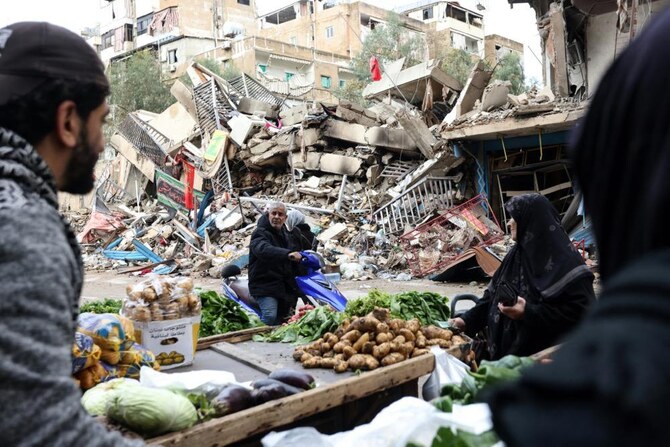JERUSALEM: Just last month, Israeli Prime Minister Benjamin Netanyahu predicted a new era of peace and prosperity in the Middle East, based on growing acceptance of Israel within the region.
Today, with the Israel-Hamas war in its fourth week, that vision is in tatters.
The mobilization of 360,000 reservists and the evacuation of 250,000 Israelis from their homes, according to numbers provided by the Israeli military, has upended many businesses. Restaurants and stores have emptied. Airlines have canceled most flights to Israel, and tourists have called off trips. A main natural gas field has been shut down, farms have been destroyed for lack of workers and businesses have furloughed tens of thousands of workers.
Israel has vowed to crush the Gaza Strip’s ruling Hamas group, which killed 1,400 people and took more than 240 others hostage in an Oct. 7 rampage in southern Israel. Israeli airstrikes have flattened entire neighborhoods in Gaza and killed more than 8,000 people, according to the Health Ministry in Gaza.

People who were attending a demonstration calling for the release of hostages held by Palestinian militants since the October 7 attack, take cover as warning sirens sound of an incoming rocket attack in Tel Aviv on October 28, 2023, amid the ongoing battles between Israel and the Palestinian group Hamas. (AFP)
Israel’s economy bounced back after previous wars with Hamas, but this round could last longer, possibly months, because the military’s self-declared mission is to end Hamas rule, not just contain the militants.
Escalation of the conflict is a tangible threat. Israel is already engaged in low-level fighting on three additional fronts – Lebanon, the West Bank and Syria. A long and possibly multi-front conflict could make it more difficult for the economy to recover than in the past. And even before the war, Israel’s economy was smarting from Netanyahu’s controversial proposal to weaken the judiciary.
Israel’s Finance Ministry has presented an economic aid plan that includes $1 billion in grants for businesses hurt by the war. Critics say it doesn’t go far enough and have demanded the redirection of some of the billions of dollars allocated to pet projects of ultra-Orthodox and pro-settler parties under coalition agreements.
This week, a group of 300 leading economists called on Netanyahu and Finance Minister Bezalel Smotrich to “come to your senses!”
“The grave blow that Israel was dealt requires a fundamental change in national priorities and a massive rechanneling of funds to deal with war damage, aid to victims, and the rehabilitation of the economy,” they said in a letter, predicting wartime expenses would soar into the billions of dollars.
They urged Netanyahu and Smotrich to “immediately suspend funding to any activities that are not crucial to the wartime effort and the rehabilitation of the economy — and first and foremost, funds budgeted for coalition agreements.”
Smotrich, leader of a pro-settler party, told Israel’s Army Radio last week that “whatever doesn’t involve the wartime effort and the state’s resilience will be halted.” But skepticism remains.
Financial barometers paint a bleak picture. The local currency, the shekel, has reached a 14-year low, while the benchmark stock index is down about 10 percent this year. The tech industry, the engine of Israel’s economic growth, started bleeding even before the war began.
Fitch Ratings, Moody’s Investors Service and S&P all warned in recent days that an escalation of the conflict could result in a downgrade of Israel’s sovereign debt rating.
Israel’s central bank has cut its 2023 economic growth forecast to 2.3 percent from 3 percent — assuming the fighting is contained in the country’s south.
The central bank has earmarked $30 billion to shore up the shekel. At a news briefing this week, central bank Gov. Amir Yaron emphasized the resilience of an economy that he characterized as “robust and stable.”
“The Israeli economy knew how to recover from difficult periods in the past and return rapidly to prosperity, and I have no doubt that it will do so this time as well,” Yaron said.
The country entered the war with foreign exchange reserves of some $200 billion. Additionally, the Biden administration wants Congress to approve $14 billion in emergency aid for Israel, most of it military funding, in addition to the $3.8 billion it receives annually.
At the start of the war, Israel ordered Chevron to halt production at the Tamar natural gas field to lower the vulnerability to prospective missiles. Energy expert Amit Mor estimated the shutdown could cost Israel $200 million a month in lost revenue.
If the Hamas-allied Hezbollah militia in Lebanon joins the war in full force, that could affect production at two other fields, including Israel’s largest, Mor said. But he doesn’t think the war would have a chilling effect on further energy exploration.
“The players are aware of the political risk. It’s existed for a long time,” he said.
Even before war broke out, Israel – an entrepreneurial dynamo with an economy rivaling countries in Western Europe — was struggling. Its coffers, once swollen by tech investments, were clobbered by the proposed judicial overhaul, which seeks to dilute the powers of the country’s courts. The government says the unelected judiciary has too much power, but supporters regard it as the most serious check on politicians’ powers. Concerns about Israel’s governance, rising inflation, and a worldwide slowdown in tech investments last year also weighed on the economy.
Investments in Israeli startups, which attracted a record $27 billion in 2021, sank by almost half last year. With investors spooked by the judicial proposal and the mass protests it sparked, investments plunged an additional 68 percent in the first half of this year, compared to the same period last year, according to Israel’s Start-Up Nation Policy Institute.
With tech accounting for 48 percent of Israel’s exports, its prosperity is crucial to the economy.
The government’s Israel Innovation Authority did a pulse check of startups during the war and found that the slowdown in capital-raising, along with employees’ call-up to reserve duty, “pose a challenge to a significant number of high-tech companies,” Chief Executive Dror Bin said.
“There are companies in danger of being closed within the next few months,” Bin said.
Still, Yaron’s emphasis on the Israeli economy’s resilience has a historical basis. The Bank of Israel calculated that the 2014 war in Gaza cost the economy 0.4 percent of gross domestic product, and the 2006 war in Lebanon pared 0.5 percent, said Professor Michel Strawczynski, an economist at the Hebrew University of Jerusalem and former director of the research department at the central bank.
“I’m expecting a big blow in the last quarter of 2023. It’s hard to say how bad, but I wouldn’t be surprised if it contracts 15 percent in annualized terms,” Strawczynski said. “But slowly, activity will resume” as economic activity pent up in wartime is released, he said.
If the war achieves its objectives, “then we will see a rebound in activity, though we don’t know when it will be,” Strawczynski said. “Things will also depend on how many fronts there are. But the important thing is length.”




































